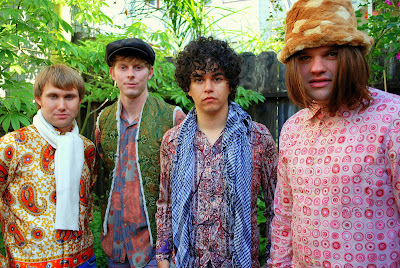
The beginning of the show is pure homage. The Mark Ten pantomime with the fervor of the Monkees and respond to interview questions with the cheekiness of the Beatles. Then, seeking to earn their place in history, they decide to create a concept album, or one in which each song serves some larger artistic purpose, the whole greater than the sum of its parts. The band’s issue is coming up with a concept—an issue they share with the playwright.
Secluded in the recording studio, Stu, (Vincent Palo) the vocalist, and Harvey (Robert Campbell), the bassist, talk without communicating and attack without engaging. Unable to compose, they rely on outside assistance in the form of Cindy, a studio musician whose odd blend of ambition and priggishness confines actress Rachel Rajput to a range of emotion from annoyance to scorn—at least, in the preview I saw. Dave (Nick Dickson), the drummer, and Lewis (Sam Leichter), on lead guitar, provide comic relief with varying levels of success. As Petal, the Mark Ten’s lone groupie, Sarah Korda gives the production’s most committed and poised performance, but Breaux’s writing muddles even this character’s arc.
Where this production most falters is in its performance of music. Though the playwright and characters supposedly live for rock and roll, the songs are all recorded, and the performers pantomime with instruments made out of cardboard. At first, when the musicians hilariously enact an Ed Sullivan-style concert, with Petal screaming awkwardly throughout it, the fake instruments work. But the props quickly reveal themselves as a default choice instead of a deliberate one. Apparently, a projection screen with period footage and photos is crucial for the production, but a real guitar or drum set is unnecessary. (For a theatre this size, budget constraints obviously curtail technical options—but minimalism does not preclude artfulness.)
Otherwise, the show looks stunning. Scenic and props designer Patricia Gillespie and costume designer Bessie Delucchi capture a variety of 1960s aesthetics, from mod to psychedelic, with startling, disorienting color. Set off by Lyrica Tyree’s lighting, the mise-en-scene becomes otherworldly, an enchanted space in which Rivera choreographs lip-synching almost beautiful enough to make up for the lack of live sound—but not quite enough to make up for the script or the acting.
The Mark Ten’s Fantastic Parade continues through January 30th at the Boxcar Playhouse, 505 Natoma Street, San Francisco. Tickets ($10 - $20) are available by phone at (800) 838-3006 or online at boxcartheatre.org.

No comments:
Post a Comment